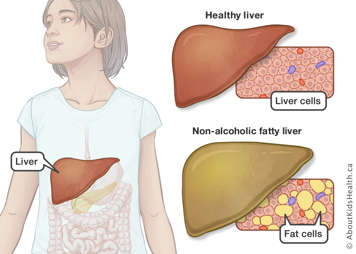Non-alcoholic fatty liver disease (NAFLD) is a condition where fat builds up in the liver. The liver is a large organ on the upper right side of the abdomen (belly). It has many important jobs including cleaning the blood of toxins, controlling cholesterol levels and managing the body’s fuel supply.

NAFLD occurs more often in people with type 2 diabetes and in people who are overweight. About one in every five teenagers or children with type 2 diabetes has NAFLD. If NAFLD is not treated, it can lead to scarring of the liver and may even lead to liver cancer or liver failure. Many people with NAFLD have no symptoms. Others may have belly pain, fatigue or jaundice (yellowing of the skin and eyes).
Diagnosis of non-alcoholic fatty liver disease (NAFLD)
A blood test can be done to help look for NAFLD. This test looks at a specific enzyme called alanine aminotransferase (ALT), which is a marker of damage to the liver. Teens and children with type 2 diabetes should have this blood test done every year starting at diagnosis.
Treatment of non-alcoholic fatty liver disease (NAFLD)
The main treatment for NAFLD is gradual weight loss and keeping blood glucose (sugar) levels in target. It is important to work with the diabetes team to make sure you lose weight safely.
For more information, visit the Canadian Liver Foundation website.